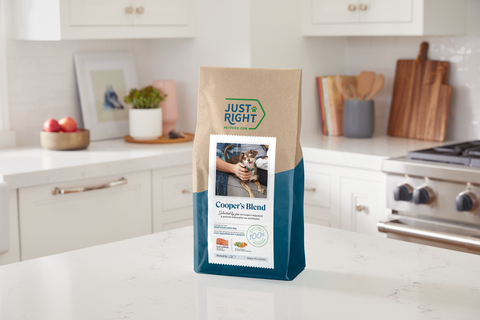Your loyal companion may be the biggest chow hound you know, gleefully gobbling their food before it even has a chance to hit the bowl. And though you’re undoubtedly doing your due diligence to make sure that food is up to snuff, sometimes their kibble just might not be doing enough. That’s because not every pup has the same needs when it comes to diet.
A custom-made kibble like Just Right can be the best way to ensure your dog is getting the kind of tailored nutrition to meet their unique needs. It’s customization made easy; when you take this simple quiz about your dog’s breed, size, age, health, and ingredient preferences, Just Right experts will craft the perfect blend to support your pup. The needs addressed can include their digestive health, weight management, skin & coat, and ingredient sensitivities. Then it’s delivered straight to your door. They also take your dog’s ingredient preferences (lamb, chicken, salmon, or beef) and life stage needs (from puppy to senior) into account. And should anything change, the formula can be adjusted at any time.
Here are some signs that it could be time to tweak your four-legged friends’ eats.
A Dull and Dry Coat
If you notice that once glorious floof is lacking luster, it could mean new nutrients are in order. Your vet can help you determine what your dog may be lacking — plus which ingredients will deliver the necessary vitamins and minerals. According to Ginger Benham, D.V.M., a licensed veterinarian in St. Petersburg, FL, if your dog’s coat is dull and dry, and their skin is showing a significant amount of dander, you should consider changing their diet to a food that is high in omega-3 fatty acids, such as a salmon-based kibble.
Your pooch seems extra itchy.
Does nothing seem to ease your dog’s itchiness, despite regular baths and full-body scratchies on the daily? This could indicate an allergy to one of the ingredients in their food, Dr. Benham says. “Contrary to popular belief, grains in the diet are not the most common source of allergic stimulation,” she points out. “Instead, common meat sources like chicken and beef top the list.” Chat with your vet to see if your dog may benefit from switching to a new protein source like venison, rabbit, salmon, or lamb.
Some Extra Weight
While extra mush may be cuddly, it’s important for pups to maintain a healthy weight. “Dogs suffering from obesity are much more likely to have associated health problems such as joint/mobility issues, difficulty breathing, increased risk of certain cancers, and more,” Dr. Benham says. “Diet is often the culprit — and in many cases — the solution as well.”
Knowing if your pet is overweight is a matter of investigation. “Run your hands over the dog’s ribs and back,” says Gabrielle Fadl, M.D., a veterinarian in Brooklyn, NY. “At an ideal weight, your pet will have a natural waist when viewed from above or from the side. A tummy that sticks out beyond the rib cage could mean your dog is overweight,” she explains, noting that you should be able to feel the dog’s ribs when you run your hands over them. When you take the customized dog food quiz on Just Right, simply select your dog’s body type as overweight and note that one of your goals is to maintain a healthy weight. That way, your personalized kibble will be formulated with those needs in mind.
An Unsettled Tummy
A little gas passed here and there is totally normal, but signs of gastrointestinal problems, like loose stool, can be associated with dietary issues, Dr. Benham says. “In some cases, a particular food may just be too rich for your dog.” In that case, she says, “A ‘sensitive stomach’ formula may be easier for your furry friend to digest.” Just be mindful that, “these symptoms could be indicative of a problem like a food intolerance or allergy,” she warns. If you suspect that’s the case, try switching to a single protein source and talk to your vet for guidance.
Plain Old Aging
Puppies grow at lightning speed during that first year, aka “one of the most nutrient-demanding life stages that dogs go through,” according to Dr. Fadl. “During the growth period, your puppy has specific requirements for several essential nutrients, such as protein, amino acids, essential fatty acids, vitamins, and minerals.” In the beginning, your pet should be eating specially formulated foods to meet those needs.
Most puppies should be transitioned to adult formulas at 8-12 months, advises Dr. Benham, though not all pups are created equal. “Giant breed dogs such as Great Danes may need to eat puppy food for a longer period of time, while smaller breed dogs, or puppies who have become overweight, may benefit from an earlier transition,” she points out.
Then, when your dog is between 7-to-12 years of age, consider a senior formula food. “This is often less calorie dense, so it may be a good option for dogs with a tendency to put on weight,” Dr. Fadl explains. “And, it may have ingredients, such as omega-3 fatty acids, that help with brain aging.”
Whatever your pup’s nutritional needs, body type, or age range, you can find their personalized meal plan at Just Right.


